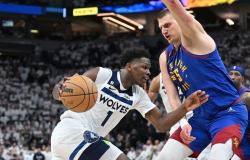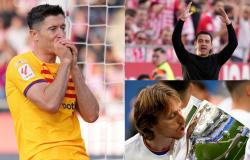LOS ANGELES — The Los Angeles Lakers’ season is on the line in Thursday’s Game 3 against the Denver Nuggets.
A 3-0 series deficit would be a death knell. Los Angeles is already facing long odds of a series comeback against the defending champions: Teams with home-court advantage that are up 2-0 in a best-of-seven first-round series go on to win 94.7 percent of the time. But another loss would put the Lakers in unenviable company: Teams that are up 3-0 win 100 percent of the time, regardless of home-court status.
While the Lakers can be better on both ends, their remaining defensive adjustments are limited. Other than ensuring Rui Hachimura does not guard Nikola Jokić one-on-one, mixing up the timing and location of double-teams against Jokić and boxing out more effectively, the Lakers have executed their defensive game plan as well as reasonably possible. There is a limit to how well any team can defend Denver.
Offensively, however, the Lakers have underperformed, especially in the second half of both Games 1 and 2. Their focus entering Game 3 is maintaining the pace and execution that led to them holding double-digit leads in both games. They’d also like to convert more shots in the paint and around the rim, where they’ve been uncharacteristically subpar. Los Angeles shot a league-leading 68.9 percent within 5 feet of the basket during the regular season but is at just 53.8 percent through two games.
“We were great defensively,” Lakers coach Darvin Ham said Wednesday when asked about the Lakers’ Game 2 defeat. “Offensively, there were a lot of shots we wish we could have back. We missed a lot of point-blank layups.”
With that perspective, here are three realistic adjustments for the Lakers entering the most important game of their season.
GO DEEPER
Lakers blow big lead vs. Nuggets in Game 2, which felt like a death blow
1. Prioritize pace and offensive organization — especially in the second half
If you want to know why the Lakers are down 2-0 in this series, look no further than their second-half collapses in both losses. Specifically, the Lakers abandoned everything that worked offensively: their organization, their finishing and especially their pace.
After getting off to great starts — leading by 12 points midway through the second quarter in Game 1 and by 20 early in the third quarter of Game 2 — the Lakers started walking the ball up the floor, draining the shot clock and showing less discipline with their execution. It’s human nature to ease up with a lead, but these are all bad habits that cost the Lakers during various points of the regular season. Now, they’re showing up in the most critical moments of the season.
“Our pace has to continue,” Ham said. “You build a lead, you can’t go to play slow or play the clock game. Like, you just have to stay aggressive, stay organized. Understand where we’re trying to go with the ball. Being aggressive in the paint. The things we’ve been preaching all year.”
The shift was obvious in both games. LeBron James, who has taken on a larger role as the lead ballhandler and maestro in the postseason, historically prefers a more deliberate style, especially when his team leads. But the Lakers aren’t good enough to play like that against the Nuggets, who possess one of the league’s best half-court offenses.
The numbers are drastic: Los Angeles’ offensive rating has dropped from 121.4 points per 100 possessions in the first half to 92.2 in the second. In addition, the game’s pace has slowed to a crawl, from 98.5 possessions per 48 minutes in the first half to just 89 in the second half. The Lakers’ assist percentage has also nosedived from 68.1 percent in the first half to 46.7 percent in the second half. Essentially, they’re significantly worse offensively, playing slower and generating fewer assisted buckets. It’s surprising considering the Lakers’ offensive turnaround over the second half of the regular season.
The unexpected decline led to an awkward back-and-forth between Davis and Ham between games.
Davis, who was scoreless over the final 19 minutes of Game 2, seemingly took a shot at the team’s preparation and execution.
“Just gotta focus on Game 3,” Davis said in a news conference after Game 2’s loss. “We’ve shown that we’re more than capable. We have stretches where we just don’t know what we’re doing on both ends of the floor. And those are the ones that cost us. So we have two days to get it right and come ready to win Game 3 on Thursday.”
The “We have stretches where we just don’t know what we’re doing on both ends of the floor” line was especially telling. Regardless of the Lakers superstar’s meaning or intent, that’s not a comment that bodes well after the 86th game of the season.
When asked about Davis’ remark Wednesday, Ham pushed back against the assertion.
“I just think sometimes, when plays don’t turn out the way you think they should, then the frustration sets in a little bit,” Ham said. “But I don’t think it is [from] us not being organized. I think I have incredibly talented coaches all along my staff. We pride ourselves, whether it’s a practice, a shootaround, a film session, a game or whatever, we pride ourselves on being highly efficient and organized. I just chalk that up to being frustrated. It’s an emotional game, the way it ended and all of that. But I’ll agree to disagree on that one.”
GO DEEPER
Darvin Ham rejects Anthony Davis’ comments on Lakers’ struggles
2. Tighten the rotation even more
One concerning trend for the Lakers: The Nuggets’ bench, widely considered a shallow group, has outplayed the Lakers’ reserves. Christian Braun and Peyton Watson have been the two best bench players in the series, largely due to their on-ball defense, rebounding and energy. It’s reached the point where the Lakers have cut their bench players’ minutes, barring foul trouble or an injury.
Taurean Prince has been the only bench player contributing offensively. He’s been a minus defensively, though and should probably play slightly less than the 21 minutes he’s averaged over the first two games. (He certainly shouldn’t play as a power forward considering Denver dominates the glass even when it uses smaller lineups.)
The Lakers have been outscored by 21 points in Spencer Dinwiddie’s 23 minutes. They’ve been outscored by 10 points in Gabe Vincent’s 23 minutes. Neither player has made a shot yet. Jaxson Hayes hasn’t even attempted one.
Of course, that could change at Crypto.com Arena in Games 3 and 4. Role players tend to feed off the energy of the home crowd and shoot better. But the reserves’ leash needs to be short. A 10-2 Nuggets run at an inopportune time could bury the Lakers and end their season.
Ham is still projecting confidence in his bench.
“Just keep trusting them, help them stay organized and encourage them to be aggressive,” Ham said.
Before Game 2, Ham said the Lakers were going back to their “normal rotation.” The substitution patterns were closer to those of the regular season, only with higher numbers for the starters. However, none of them cracked 40 minutes after three did so in Game 1 (Davis, James and D’Angelo Russell).
At this point, the Lakers should be playing all five starters at least 35 minutes, with Davis and James above 40 minutes. Austin Reaves should be in that range, too, since he is the team’s best option to defend Jamal Murray. Russell and Hachimura each had a stinker, but they’re much better than their bench replacements, so even their bad games are worth keeping them on the floor.
The Lakers could add reinforcements at some point if forwards Jarred Vanderbilt and Christian Wood return during this series. However, both were ruled out ahead of Game 3, and Game 4 is only two days away.
Vanderbilt would immediately help with his defense, rebounding and energy, likely taking minutes from a combination of Hachimura, Prince and Dinwiddie. Wood’s role and value is slightly less clear. Hayes is already barely playing, and the Lakers need Davis for 40-44 minutes. There’s a chance Wood is capped by circumstance, if he even plays at all.
3. Don’t let Denver dictate their offensive strategy
Denver made an important defensive adjustment early in the second half of Game 2 that drove its second-half comeback.
In the first half, the Lakers continuously targeted Jokić in the pick-and-roll, with James calling up Davis, who was defended by Jokić, to screen for him. That either gave James a lane to get downhill or created a runway for Davis to attack Jokić in space. The result was Davis’ 14-for-15 start for 32 points in the game’s first 29 minutes.
After a timeout at the 10-minute mark of the third quarter, though, the Nuggets countered, switching Jokić off Davis and onto Hachimura. Aaron Gordon then slid from James over to Davis, with Kentavious Caldwell-Pope moving off Russell and onto James.
These matchup adjustments had a grand ripple effect. The Lakers had to make a choice between continuing to target Jokić with Hachimura as the screener or to keep feeding Davis against a better defender in Gordon. They decided on the former, which, in retrospect, was a mistake.
Hachimura doesn’t have the same gravity as a roller and struggled to catch passes and finish at the rim in Game 2. The Lakers parked Davis in the corners to drag Gordon away from the fray, which simultaneously rendered Davis, the Lakers’ primary offensive weapon in the game up to that point, ineffective.
There’s a reasonable chance the Nuggets start with the same matchups in Game 3 or at least go back to them later in the game. In that case, the Lakers can’t let Denver dictate the terms of engagement again. Los Angeles could have continued attacking Denver with James-Davis pick-and-rolls, forcing the Nuggets to switch the smaller Caldwell-Pope onto Davis or allow James to attack downhill against a more traditional pick-and-roll coverage.
For as good of a defender as Gordon is, the Lakers could’ve at least tested him. Instead, they treated the matchup as if Davis couldn’t score one-on-one against Gordon. There isn’t a player in the league Davis can’t score against. Considering Davis had made 14 consecutive shots at one point, it’s mind-boggling that he finished with only 19 field goal attempts and just one in the fourth quarter.
“Definitely keep him moving around and his points of attack and different places, whether it’s an off-ball screen, him posting up or him in the pick-and-roll, but they also have other guys who we try to target,” Ham said. “And try to put them in difficult situations. The guys who aren’t premier defenders such as KCP or Aaron Gordon. Again, it’s a healthy balance that you have to have in terms of when you’re targeting someone and also trying to maintain your rhythm offensively with everyone else on the floor.”
Additionally, the Lakers could’ve gone to James in the post or the elbow against the smaller Caldwell-Pope. The 31-year-old former Lakers guard is an elite perimeter defender hounding the ball and chasing around screens, but is more vulnerable against bigger wings who can simply overpower him. James checks that box. The one time the Lakers posted up James, he ripped through and made an and-1 jumper over Caldwell-Pope.
“My approach hasn’t changed throughout my 21-year career,” James said. “I’ve been guarded by smaller guys, bigger guys throughout my whole career. It’s all about getting the best shots for my teammates, for myself. Especially in the fourth quarter.”
The Lakers have planned for various counters to Denver’s potential responses to those adjustments, but that is all theoretical. In Game 3, and the rest of the series, the Lakers need to implement those changes and go from there.
“We got it better,” James said. “We know some of the things that we can do better. … But there’s only so much we can talk about. We got to go out and be about it too. So all the conversations and talk, ‘OK, we got to do this, we got to do this,’ but we got to go out on the floor and actually make it happen.”
(Top photo: Stephen Lew / USA Today)







